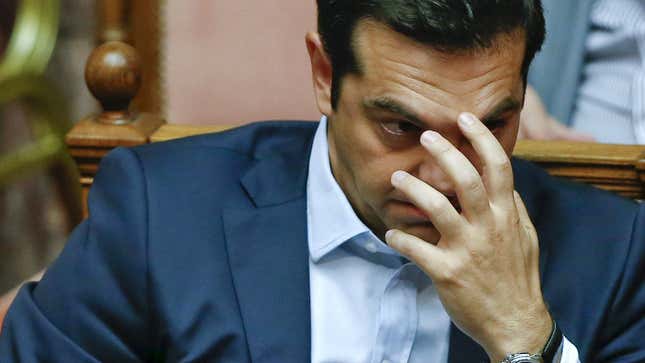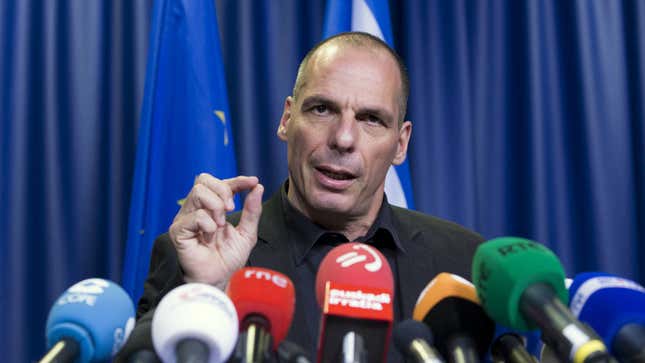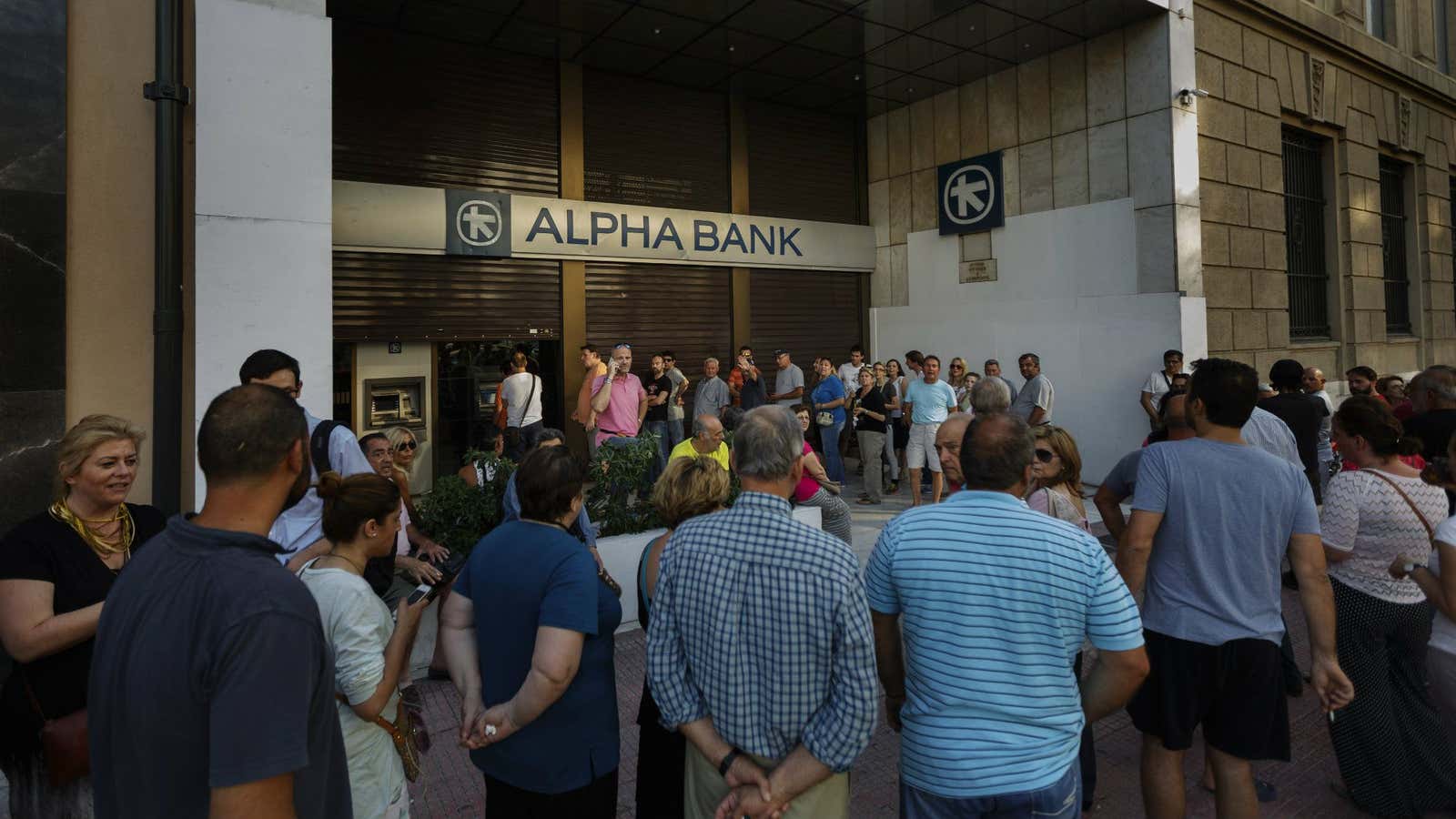Democracy is messy. The Greeks know this better than most, having essentially invented the concept.
But by unexpectedly calling for a public vote on its latest bailout proposal, the Greek government—in the name of democracy— has triggered a highly uncertain sequence of events that it seems ill-equipped to manage. The latest brinksmanship led Greeks to empty their bank accounts over the weekend, fearing for the stability of the country’s teetering financial system.
To stem the tide, banks will be closed on Monday (June 29), with withdrawals at cash machines likely limited to just €60 per day when they do reopen. These drastic restrictions are necessary to keep the banks afloat, and more importantly, to keep Greece in the euro zone. The euro itself took a bit of a beating in early Asian trading.
The turmoil unleashed by the unexpected referendum—made visible by long queues at cash machines across the country—threatens to sever the bailout lifeline on which Greece has relied for the past five years, once and for all. Already in a deep depression, things could get even worse in Greece. In fact, a prominent Greek politician once warned about holding such plebiscites:
If the Greek prime minister himself tries to have the people face such dilemmas… the Greek banks and the Greek economy will collapse before we even reach the voting booth… because of the possibility that the people may face such a dilemma, they might vote “no.”
That politician was the current Greek prime minister Alexis Tsipras, who back in 2011 criticized the then-prime minister for the recklessness of calling a referendum on a previous bailout agreement (the vote was eventually cancelled and cost the leader his job).
Now that Tsipras is in power and campaigning against his own advice, it’s no wonder that the outcome of the latest chapter in Greece’s bailout drama is so hard to predict.
What the hell happened?
Tsipras blindsided everyone by calling a national referendum on whether the government should accept or reject its creditors’ latest proposal to prolong the country’s bailout.

Tsipras announced the referendum in a televised address in the wee hours of Saturday (June 27). The vote will be held on July 5, he said, which would require a short extension of the current bailout agreement beyond the end of June. But later that day, euro zone finance ministers rejected the extension request. For once, negotiators appeared to honor a deadline.
Although the logic of the Greek government’s referendum gambit is understandable—in essence, let the people pick their poison—its execution is clumsy, to say the least. There is the surreal possibility that, on July 5, Greeks will vote on a proposal that is no longer on offer.
And now?
Greece is broke—on this we can all agree. On Tuesday (June 30), when Greece’s bailout agreement expires, the country owes the IMF some €1.5 billion ($1.7 billion) in loan repayments. This is the first of many bills Athens faces in the coming weeks that it almost certainly cannot pay without unlocking additional financial aid. A default now seems inevitable.
Although unwelcome, stiffing the IMF is not considered a default by the main credit ratings agencies, which are focused on debt held by private-sector lenders. The IMF also gives late payers warnings and some time to clear their arrears before publishing an official notice of default.
Clauses in Greece’s debts to the euro zone’s rescue fund and the ECB include provisions to call in loans if the country misses a payment to other creditors, but officials suggest that they wouldn’t be quick to enact these clauses as long as there is hope of reaching some sort of deal that would keep Athens afloat.
Are the banks about to go bust?
If this all seems very confusing, that’s because it is. And the biggest source of confusion is about whether the Greek financial system can function if the country’s bailout agreement is allowed to expire.
If it cannot, and no help from euro zone institutions is forthcoming, the only way to prop up bankrupt banks and pay the state’s other bills might be to ditch the euro and start printing drachmas, which unlike the euro would be wholly under the control of the Greek state.
Shunned by the markets, Greek banks’ only affordable source of ready cash to meet rising withdrawals comes from so-called “emergency liquidity assistance” from the European Central Bank. After progressively lifting the amount of emergency support it would provide to Greek banks, today the ECB said that due to the breakdown in bailout talks it would instead freeze its support at current levels, which simply isn’t enough.
That means the only way to stem the outflow of cash from banks is to impose these new capital controls. In announcing the measures tonight, Tsipras dubbed the ECB’s cap on emergency bank liquidity an attempt to “stifle the will of the Greek people” ahead of the referendum.
So, what happens next?
Expect a bitter week of recriminations, unease, and fear. Greece’s creditors blame Greece for breaking off negotiations, and further aid will not be forthcoming without a drastic change of heart from the Greek government. In the meantime, the ECB’s emergency support is capped, but not withdrawn, ensuring a low level of life support for banks that are clinging to cash by closing their doors and restricting transfers. This is the backdrop for the run-up to the referendum.

For his part, Tsipras is poised to push for a “no” vote via a “campaign with nationalist-populist overtones and based on messages of defiance, resistance against ‘foreign intervention,’ oppression by [creditors] and giving a say to voters,” says Wolfango Piccoli, an analyst at research group Teneo Intelligence. These are the themes that propelled Syriza to power in the first place, and for which it maintains high approval ratings.
But polls show that a majority of Greeks also want to stay in the euro zone. Indeed, Greek finance minister Yanis Varoufakis admitted to reporters that there is a “very high probability” that Greeks may vote “yes”—that is, approve the lenders’ proposals against the wishes of the government.
Needless to say, this would put the government in a difficult spot, and almost certainly require a leadership reshuffle or possibly a fresh election. The opposition will point to the panicky queues at cash machines and shuttered bank branches as signs that the government is pushing the country out of the euro and into uncharted territory. Analysts also expect volatility across European markets, with investors retrenching to the safest assets and dumping the euro. And history shows that capital controls tend to remain in place for a long time without drastic action.
And so the Greek people have been thrown into the deep end, their financial future more uncertain than ever. In a week’s time, they will be asked to make a choice that will determine the economic path of their country, with both options bringing different sorts of pain onto a people who have already suffered greatly.
Like so much else to do with the dealmaking over the past several months, the actions of the key players—on both sides—feel improvised at best, incompetent at worst, and incoherent throughout.
